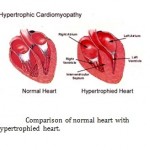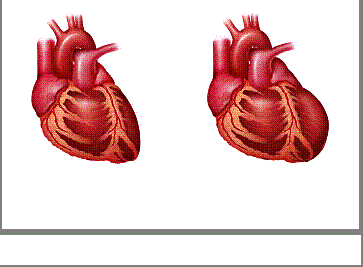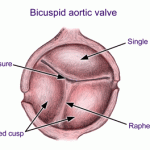What are the symptoms of cardiac enlargement?
Some people can have varying degrees of cardiac enlargement and have no symptoms. Once dilation or hypertrophy begins to place undue demands on heart function, however, symptoms do result. These can include:
- Shortness of breath
- Chest pressure or pain
- Palpitations (a sense that the heart is beating rapidly or forcefully or “skipping beatsâ€)
- Swelling of the feet, ankles, or legs
- Dizziness or lightheadedness
- Loss of consciousness
In milder forms of cardiac enlargement, the symptoms may occur only with exercise or exertion. In more severe forms, they can occur at any time, even while resting. Other heart and lung problems and other diseases can cause these symptoms as well, so they are not specific to cardiac enlargement.
How is cardiac enlargement diagnosed?
Cardiac enlargement can sometimes be diagnosed based on a physical examination by a physician or other health care provider. A patient’s symptoms or family medical history, high blood pressure, characteristic heart murmur, forceful heart beat, swelling of the legs, or the sound of fluid in the lungs can be clues to the diagnosis. A chest x-ray can show an enlarged heart size or fluid in the lungs and an ECG will often show increased waveforms, indicating LVH or RVH. In fact, it has been suggested that ECG be used to screen young athletes for hypertrophic cardiomyopathy. Unfortunately, cost issues are likely to prevent this from being done on a large-scale basis.
The best way for a physician to evaluate cardiac enlargement is with an echocardiogram. This test uses a form of ultrasound similar to that used to look at gallbladders, kidneys, and pregnant women’s babies. Using a sophisticated computer and monitor and a small plastic probe and some gel placed on the chest, the echocardiogram can directly show the size and thickness of the heart muscle in each chamber. It can also gauge heart function, an important piece on information when deciding how to treat the enlargement.
Is treatment for cardiac enlargement necessary? Is the condition permanent?
 Because any of the forms of cardiac enlargement will result in an increased risk of death and decreased quality of life for most patients, treatment is strongly recommended. Treatment may slow or reverse the disease process and help symptoms, if they are present. When cardiac enlargement is diagnosed early, treatment is recommended even before symptoms start.
Because any of the forms of cardiac enlargement will result in an increased risk of death and decreased quality of life for most patients, treatment is strongly recommended. Treatment may slow or reverse the disease process and help symptoms, if they are present. When cardiac enlargement is diagnosed early, treatment is recommended even before symptoms start.
Unfortunately, in cases of cardiac dilation, whatever damage has been done is usually permanent; treatment will focus on improving heart function, in spite of the damage. In some cases of hypertrophy, however, at least some of the muscular thickening can be reversed by the use of beta-blocker medication. In addition, the calcium channel blocker – verapamil has been shown to improve prognosis for those with hypertrophy by directly relaxing the heart muscle.
What is the treatment for cardiac enlargement?
For patients with cardiac enlargement, all underlying causes – such as high blood pressure, hemochromatosis, thyroid problems, pulmonary blood clots, sleep apnea, emphysema, chronic bronchitis, lupus or other inflammatory disease – should be treated as completely as possible. This will decrease the chance of ongoing damage to the heart. Metal exposure or alcohol or cocaine use should be controlled or eliminated, when applicable. If medications for HIV or schizophrenia are a factor, risks and benefits of continuing or changing medications should be considered. Luckily, there are alternative medications in many cases. Those with valvular heart disease should have their condition treated with medication. Depending on a variety of factors, heart valve replacement or repair – either through “open heart†surgery or with a catheter entering the heart through a blood vessel at the groin, in a procedure similar to that used for a coronary angiogram – may be recommended.
Cardiovascular or coronary artery disease (CVD or CAD) can cause dilated cardiomyopathy and can severely complicate either form of cardiac enlargement and should be aggressively treated. Treatment for CVD/CAD  and its risk factors – smoking, high dietary and blood cholesterol levels, diabetes, high blood pressure, being overweight and sedentary – includes the use of medications, lifestyle changes, angioplasty with or without coronary artery stenting, or bypass surgery.
 In situations of either dilation or hypertrophy, heart failure can be treated with medications like beta blockers (to relax the heart), ACE inhibitors or the newer angiotensin receptor blockers (to decrease the pressure against which the heart has to pump), diuretics (to ease breathing and help decrease excess fluid in the lungs and body), and digoxin and other medications (“inotropesâ€) which improve the heart’s pumping strength. In severe cases, salt and fluid intake may be controlled.
In situations of either dilation or hypertrophy, heart failure can be treated with medications like beta blockers (to relax the heart), ACE inhibitors or the newer angiotensin receptor blockers (to decrease the pressure against which the heart has to pump), diuretics (to ease breathing and help decrease excess fluid in the lungs and body), and digoxin and other medications (“inotropesâ€) which improve the heart’s pumping strength. In severe cases, salt and fluid intake may be controlled.
Based on a number of factors, the chance of irregular heart rhythms can be reduced by using a variety of medications. For patients at highest risk, an implantable cardioverter-defibrillator can be life saving. For slow or blocked heart rhythms, a pacemaker may be needed.
Due to the risk of blood clot formation in a weak, dilated heart, blood thinners like warfarin (brand name Coumadin) are recommended for those with very poor heart function or those who have already had an episode of clotting.
Cardiac rehabilitation in the form of a structured exercise program can help reduce symptoms and improve exercise tolerance for those with cardiac enlargement.
For some of those with hypertrophic cardiomyopathy, where the thickened heart muscle blocks blood flow from the ventricle, there are procedures to reduce sections of heart muscle and improve heart function. One of these, a septal myomectomy, requires open heart surgery. A non-invasive option, called an alcohol septal ablation, involves a procedure and catheter similar to an angiogram. Instead of using contrast dye, however, alcohol is injected. This causes muscle cells in the thickened septum to die, reducing blood flow blockage. Heart transplantation is a last-resort option for selected patients with either type of cardiac enlargement and severely decreased heart function.
When should I seek treatment for cardiac enlargement?
If you have any symptoms of heart disease, either with exertion or at rest, you should see a doctor promptly. Symptoms include:
- Shortness of breath
- Chest pressure or pain
- Palpitations
- Swelling of the feet, ankles, or legs
- Dizziness or lightheadedness
- Loss of consciousness
These may indicate cardiac enlargement or may be due to other heart or lung problems or other conditions that may require treatment.
You should also seek treatment if a family member has hypertrophic cardiomyopathy. In this situation, a physical exam and a screening ECG are usually performed. This may be followed by an echocardiogram, if abnormalities are found or if suspicion continues.
Where can I learn more about cardiac enlargement?
The following organizations offer additional information about cardiac enlargement:
The Cardiomyopathy Association is a private charitable organization based in the United Kingdom which provides educational information and networking for those with cardiac enlargement and their families. Their Web site, address, and phone number can be found at www.cardiomyopathy.org.
The National Heart Lung and Blood Institute of the National Institutes of Health has information on its Web site.
The American Hearth Association has information on the topic on its Web site.

